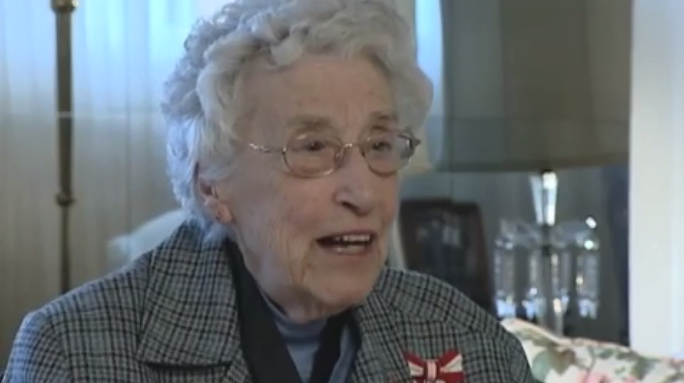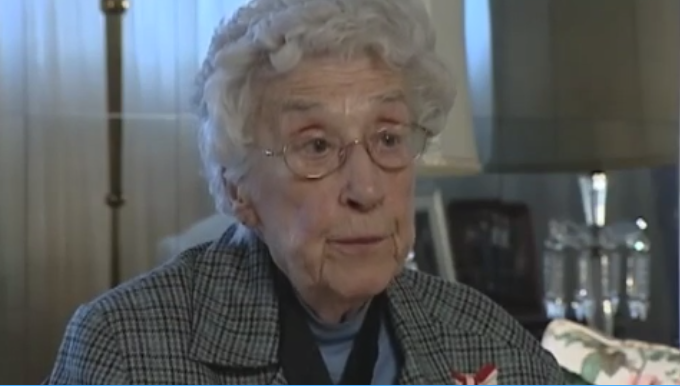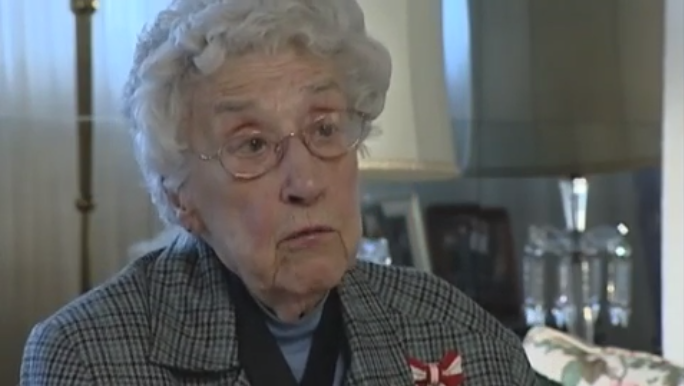So we landed at that wonderful prefabricated harbour called
Mulberry and that was another experience that we had because we
landed actually at that spot. And then we piled into lorries and
off we went up through the country side and all the fellows
cheered us like crazy when they saw we were gals, you know,
and we were quite pleased about it I guess. So then we landed in
a field and this is where all our equipment had been placed.
The whole equipment for a 600 bed hospital including all the
canvas. These tents that had to be all erected. And that was
one of the most marvellous things I thought of afterwards.
The concept of how everything was moved. There we were, our
whole unit, the doctors and the men had gone ahead and then the
nurses came afterwards and all our equipment was in these
meadows and it was masses of it. How in the name of patience
with all the billions of tons of equipment that was moved before
we ever went. Ready... you know, after D-Day started.
The ammunition, the oil, the food, the hospital, everything had
to be worked out to the last minute and where it was gonna be
when it landed. It was incredible. The logistics had to
be seen to be believed. It was, it was fantastic. I’m sure
logistics today are much improved, but I thought it was
really quite, quite, wonderful. So the men busy setting up the
tents and...we each, two nursing sisters had a tent between them.
They were small, they were called 160 pound tent. They had a
short little wall and a peak and they were quite comfortable. We
put a string between the tent poles and hung our stuff on that
and we each had a tin trunk that had been shipped and landed
in our orchard. It was in an orchard where we lived. There was
our personal things were all there, and we used those, a little
dressing table, you put a towel over it and eventually somebody
found me a nice chair. A guy that had gone to a dump, he found
me a nice chair. And a very resourceful, this was one of my
first patients, a reaming officer, a British officer went to
the dump and built me a little gas stove that just fitted a
square tin and I could always have warm bath water. It was like
a miracle having it. You just pumped it up like a little camp
stove and it was marvellous, and I took that everywhere with me
you can be sure because to have warm water was really a blessing,
you know. And that’s where we started our receiving of
patients, of all types, in sizes, and the sick along with the
wounded and you, nursing in a tent was very different. We
didn’t have any floors in the tents. There was no electricity.
We had those lamps like you have in the barns. Kerosene
lanterns at nigth and I was always worried
because there was German patients usually,
that my hand would be shaking and I’d make a
shadow on the wall of the tent, because we still received some
shrapnel coming over us from the firing. It wasn’t very bad but
the, actually our commanding officer said he wanted the nurses
to not sleep on their cots or, now what, oh he issued us all
mattresses and we were suppose to sleep underneath the cots,
that was it . We didn’t have mats on our little camp beds that
were, we had a little camp bed each that folded, but these were
the beds that were in the wards and they were still folding, but
metal bed and we had mattresses put on them to protect us from
the shrapnel. Well it was not a very good choice because there
were lots of little lizards and mice and things running around in
the tent and it was a choice. Did you sleep up top or did you
get under with the livestock. So you know what the choice was.
Everybody slept on top and put their tin hats over their faces,
sort of, and their wash basins over their tummies and that was
it. But there was only, I think I can remember only about seven
or eight people having shrapnel come through their tents,
but it could be you know, it could be very dangerous,
but it wasn’t. We were lucky.






